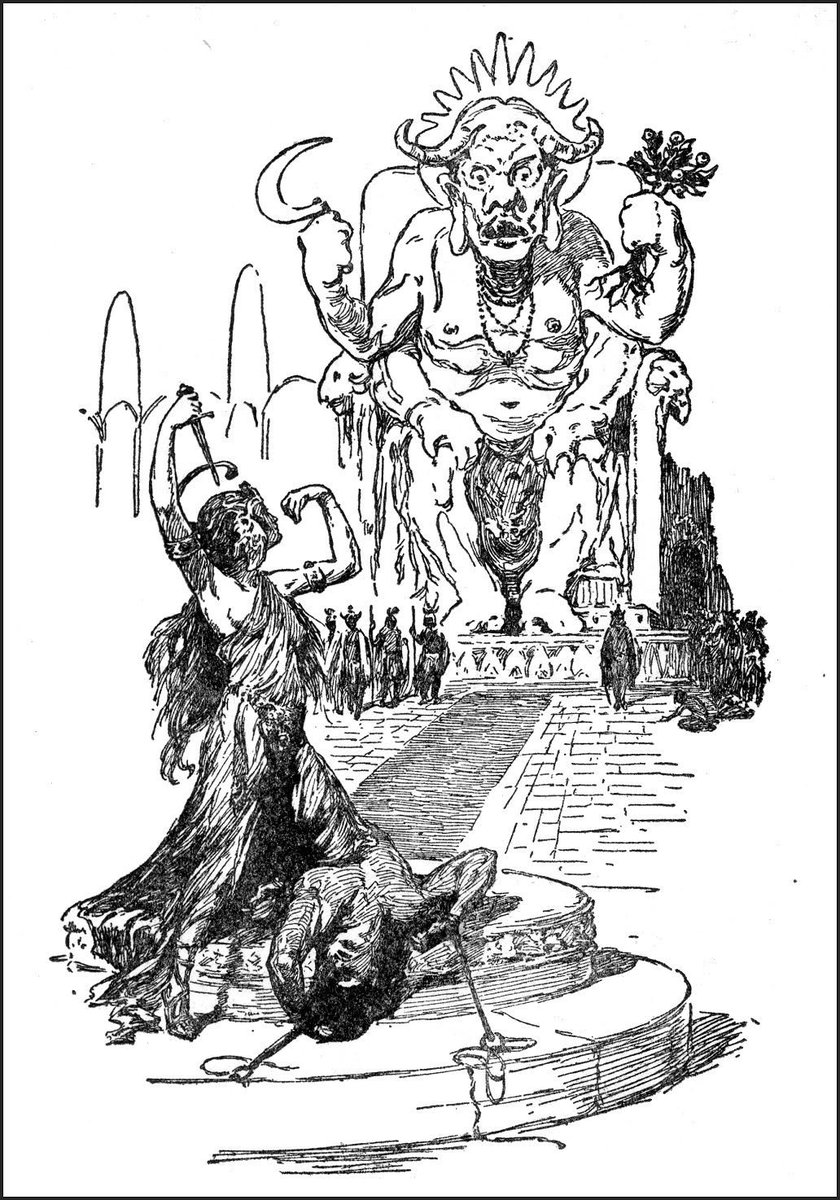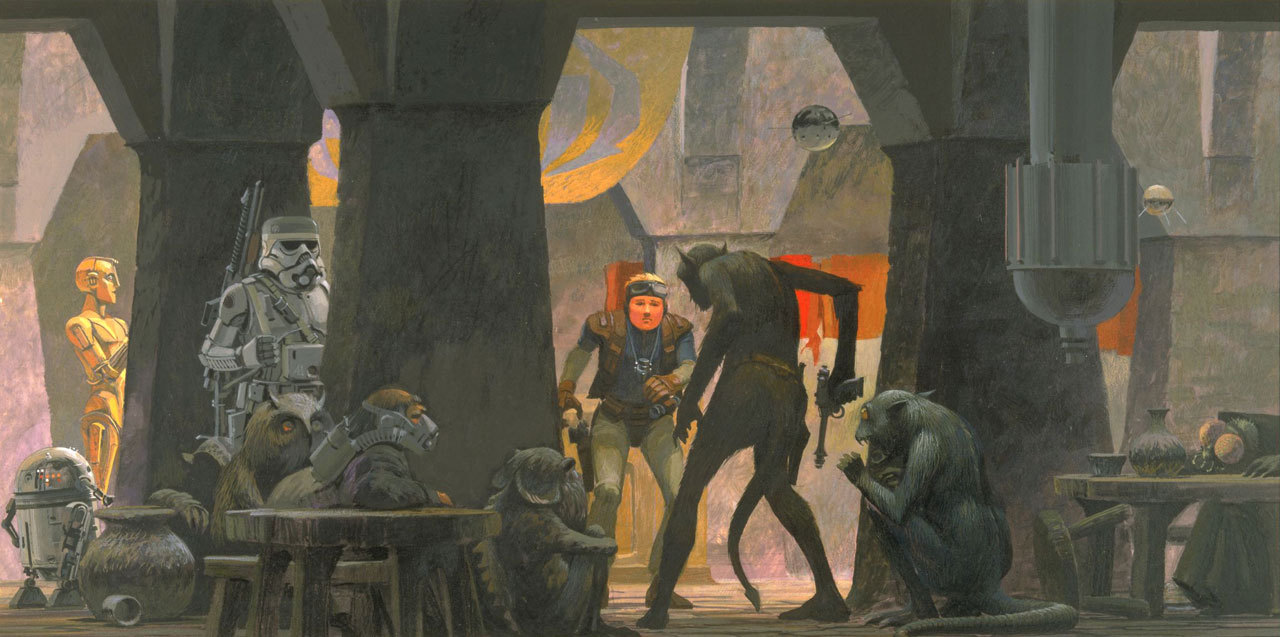8 hours ago
Sunday, March 10, 2019
Random Mars
Mars shows less variation that Venus in pulp and old sci-fi sources. Still, not all Marses are alike, so you deserve your own unique yet very derivative one! Let the randomizing commence:
Basic Theme:
1-2 Dying - The world is desiccating and civilization is trying to stop it/adapt to it.
3-4 Worn Out - It lost the planet formation lottery and is a dried up, "failed earth." Civilization is of any sort
5-6 Doomed - The world is drying up, and civilization is too decadent to care.
Atmospheric Density:
1-2 Complete breathable
3-4 Anyone not from the Andes or Himalayas will need to acclimate
5-6 Earth folk need oxygen
Temperature:
1-2 Like Southern California
3-4 Gobi Desert Spring in the day, Gobi Desert winter at night
4-5 Artic Circle
Water?
1-2 Poles and canals only
3-4 Nothing above ground, no canals
5-6 Some shallow seasonal wetlands where once were mighty seas
Dying World Civilization:
1 Wise and Noble but tinged with Melancholy
2 Overly Cerebral
3 Passionate and Vibrant but Tradition-bound and/or Factionalized
4 Post-technological
5 Post-sophont
6 Only the Robots are Left
Decadent Civilization:
1 Atavistic; Fallen into Primitivism
2 Withered bodies, minds consumed with the distant and abstract
3 Devoted entirely to bloodsports and other dubious pleasures
4 Consumed by meaningless sectarian struggle
5 Enslaved by something
6 Destroyed by war, with few mutated survivors
What do Earthmen Want?
1 More room
2 Drug Tourism
3 Ancient Technology
4 Powers of the Mind
etc.
Friday, March 8, 2019
Random Venus
Modern science tells us Venus is a hellscape resulting from runaway greenhouse effect, but that was not always the way we imagined it to be. Early sci-fi and pulp sci-fi Venus was general assumed to be verdant under its eternal cloud cover. Sure, even before space probes spoiled all the fun, Venus had already been conceived of as a harsh desert wracked by storm (see Anderson's "Big Rain"), but mostly it's drippy jungles.
That still leaves a lot of variation. Here are some random charts to make your own pulp Venus or similar worlds:
Basic Terrain:
1-2 Oceanic
3-4 Desert
5-6 Jungle
7-8 Swampy/Low-lying
9-10 Tidally Locked (as seen in Weinbaum's "Parasite Planet." Dayside is a desert and nightside is frozen. Action's in the Terminator)
Basic Theme (probably applies to anything but desert, but up to you)
1 Eden - Almost too pleasant and inviting
2 Primeval - Like Earth in an earlier age, perhaps the Mesozoic or Triassic?
3 Hostile - Too hot, too wet, too fecund, too alien. Humankind finds it tough. Roll below.
4 Hell - Like hostile turned up all the way. Roll Below.
Why So Inhospitable?
1 Endless Rain (Bradbury, "Death-By-Rain")
2 Parasitic Life
3 Horrible Storms
4 Giant Monsters
5 Everything Wants to Eat You
6 The Natives Have a Horrible Secret
Dominant Lifeform
1 Reptilian* (includes Dinosaurs in the pulp era)
2 Amphibian
3 Plant/Fungal
4 Icthyoid
5 Humanoid
6 Hyper-evolved - brain things/energy creatures
One Notable Thing
1 Gaseous Sea
2 Alluring Slave Girls/Guys
3 Rare Element
4 Mysterious Artifact
5 Giant Trees
6 Ancient Ruins
add your own!
That still leaves a lot of variation. Here are some random charts to make your own pulp Venus or similar worlds:
Basic Terrain:
1-2 Oceanic
3-4 Desert
5-6 Jungle
7-8 Swampy/Low-lying
9-10 Tidally Locked (as seen in Weinbaum's "Parasite Planet." Dayside is a desert and nightside is frozen. Action's in the Terminator)
Basic Theme (probably applies to anything but desert, but up to you)
1 Eden - Almost too pleasant and inviting
2 Primeval - Like Earth in an earlier age, perhaps the Mesozoic or Triassic?
3 Hostile - Too hot, too wet, too fecund, too alien. Humankind finds it tough. Roll below.
4 Hell - Like hostile turned up all the way. Roll Below.
Why So Inhospitable?
1 Endless Rain (Bradbury, "Death-By-Rain")
2 Parasitic Life
3 Horrible Storms
4 Giant Monsters
5 Everything Wants to Eat You
6 The Natives Have a Horrible Secret
Dominant Lifeform
1 Reptilian* (includes Dinosaurs in the pulp era)
2 Amphibian
3 Plant/Fungal
4 Icthyoid
5 Humanoid
6 Hyper-evolved - brain things/energy creatures
One Notable Thing
1 Gaseous Sea
2 Alluring Slave Girls/Guys
3 Rare Element
4 Mysterious Artifact
5 Giant Trees
6 Ancient Ruins
add your own!
Thursday, March 7, 2019
More Omniverse
 |
| source |
Two new (old) Omniverse posts from Google+ were released today. Give her movie opening this weekend, Captain Marvel (or Ms. Marvel) gets her due in "This Woman, This Warrior," and just out of February, I examine the birthdays of both Superman and the original Captain Marvel in "Leap Day."
Wednesday, March 6, 2019
Wednesday Comics: Things I Read Recently
Classic Star Wars
From 1981-84, the Star Wars newspaper comic strip was written by Archie Goodwin and drawn by Al Williamson. I am a big fan of Williamson particularly with sci-fi, and these stories, while hardly standouts, are serviceable, and will make you nostalgic for the days before Star Wars became a genre unto itself with an immense backstory.
Peter Cannon: Thunderbolt #1
You know, of course, that Alan Moore had at one point pitched the idea of that would become Watchmen using the characters DC had acquire from Charlton Comics. One of those was Peter Cannon aka Thunderbolt, who was the initial inspiration for Ozymandias. Morrison used the Charlton characters in a way that referenced Watchmen in Multiversity, by DC had lost the rights to Peter Cannon by that time. Enter Dynamite and Kieron Gillen, who (mild spoilers) pits one version of Peter Cannon against another, with the fate of the world at stake.
Martian Manhunter #3
I keep telling you this is good.
From 1981-84, the Star Wars newspaper comic strip was written by Archie Goodwin and drawn by Al Williamson. I am a big fan of Williamson particularly with sci-fi, and these stories, while hardly standouts, are serviceable, and will make you nostalgic for the days before Star Wars became a genre unto itself with an immense backstory.
Peter Cannon: Thunderbolt #1
You know, of course, that Alan Moore had at one point pitched the idea of that would become Watchmen using the characters DC had acquire from Charlton Comics. One of those was Peter Cannon aka Thunderbolt, who was the initial inspiration for Ozymandias. Morrison used the Charlton characters in a way that referenced Watchmen in Multiversity, by DC had lost the rights to Peter Cannon by that time. Enter Dynamite and Kieron Gillen, who (mild spoilers) pits one version of Peter Cannon against another, with the fate of the world at stake.
Martian Manhunter #3
I keep telling you this is good.
Monday, March 4, 2019
The Off-Worlder Funnel
The death rate would be pretty high, particularly if you drop them in a typical D&D world and allow for the almost absurd horrors of the dungeoncrawl. It would be an interesting way to do a DCC-esque funnel with starting characters other than the usual suspects.
Here's another image of regular folks dying tragicomic deaths from "Planet of the Damned" in Starlord #2 (1978).
Sunday, March 3, 2019
The Martian Froniter
 |
| A Martian farmhand |
Strange monuments, pyramids, and the occasional ruin reveal the existence of a Martian civilization of the past, when it was perhaps a greener world. Historians are divided over whether any of the current inhabitants are related to these ancient people. The gangly limbed, barrel-chested Sand People of the deep desert that raid Earther settlements, show no cultural interest in the old places and are as ignorant of the ancient hieroglyphs as they would be the mating habits of a Venusian dracosaur. The rodentine scrappers with their crawling junkyards seem no better adapted to the Martian environment that humans.
The Amos Isley Spaceport (named for one of the early rocket barons of the Red Planet) is as raucous as most of the other farm town settlements are quiet. Many a being with a price on its head ends up hiding out here, and in fact, interplanetary criminal gangs are known to have hideouts in the Martian wastes.
Thursday, February 28, 2019
Solar Trek: The Amok Trigger
These are the voyages of the exploratory vehicle, Enterprise...
In 2262, Dr. Leonard McCoy discovered the continuation of outlawed genetic practices among certain prominent families of Mars. This was revealed when Enterprise's first officer, Commander Spock began experiencing drastic mood swings and neurologic pain. Neurochemical triggers made Spock seek to return to Mars, regardless of his orders to the contrary.
The cause of his condition was an engineered gene sequence, created in the 21st Century by Martian geneticists for the purpose of making arranged marriages among their people compulsory and binding. The small, modified human population of Mars practiced arranged marriage for purposes of genetic diversity and promotion of genes critical for survival in the partially terraformed Martian environment to come over the next century. An unidentified family member of Spock's betrothed had introduced the genetic sequence through use of a viral vector when Spock was in his teens. The reasons are unclear, but may have had to do with Spock's father's diplomatic position.
T'Pring, Spock's betrothed, was absolved of any wrongdoing in regard to the genetic manipulation, but she did instigate a trial by combat that could have resulted in the deaths of one or more Space Fleet officers in order to be free of her obligation to Spock.
Dr. McCoy was able to repair the genetic damage to Commander Spock. His efforts led to a greater understanding of historic Martian gene-engineering techniques.
In 2262, Dr. Leonard McCoy discovered the continuation of outlawed genetic practices among certain prominent families of Mars. This was revealed when Enterprise's first officer, Commander Spock began experiencing drastic mood swings and neurologic pain. Neurochemical triggers made Spock seek to return to Mars, regardless of his orders to the contrary.
The cause of his condition was an engineered gene sequence, created in the 21st Century by Martian geneticists for the purpose of making arranged marriages among their people compulsory and binding. The small, modified human population of Mars practiced arranged marriage for purposes of genetic diversity and promotion of genes critical for survival in the partially terraformed Martian environment to come over the next century. An unidentified family member of Spock's betrothed had introduced the genetic sequence through use of a viral vector when Spock was in his teens. The reasons are unclear, but may have had to do with Spock's father's diplomatic position.
T'Pring, Spock's betrothed, was absolved of any wrongdoing in regard to the genetic manipulation, but she did instigate a trial by combat that could have resulted in the deaths of one or more Space Fleet officers in order to be free of her obligation to Spock.
Dr. McCoy was able to repair the genetic damage to Commander Spock. His efforts led to a greater understanding of historic Martian gene-engineering techniques.
Subscribe to:
Comments (Atom)



















